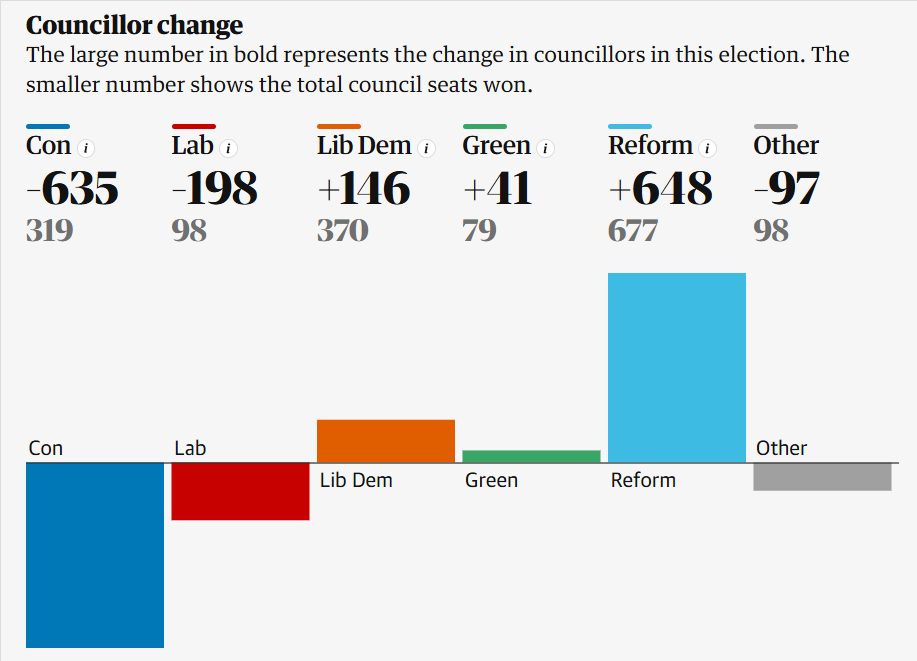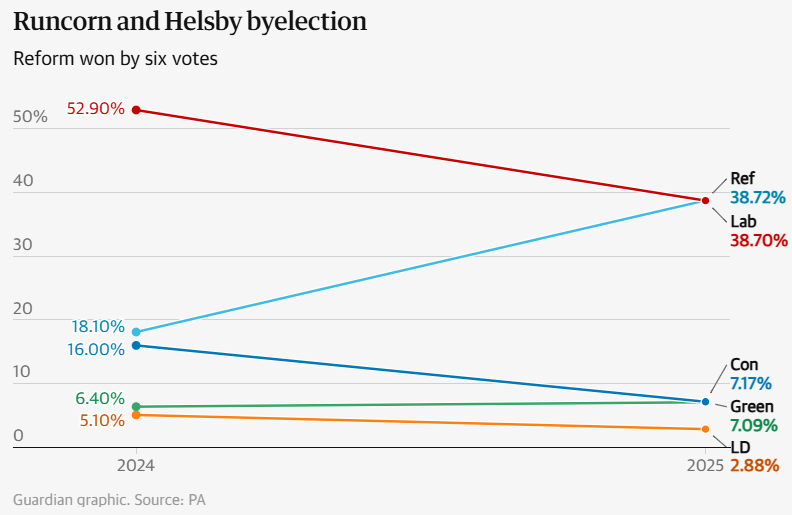The left is missing out on AI: ‘…ceding debate about a threat and opportunity to the right.’
Recently I read:
In 1984, An Unemployed Ice Cream Truck Driver Memorized A Game Show’s Secret Winning Formula. He Then Went On The Show: …and became rich, for a while.
Where are all the ‘Don’t tread on me’ Americans?: ‘If you oppose tyranny, the people of Minneapolis are your brothers and sisters in arms, regardless of what you think about immigration.’
Definitions for populism, nativism, authoritarianism
An article in a recent issue of the Byline Times headlined “The British Political-Media Class’ Mainstreaming of the Populist Radical-Right” provides nice simple definitions of some of the words that sadly we’re having to use more and more when considering modern day politics where I live and beyond. These are frequently used words that are often used in a vague or confusing way in my experience.
Here are three that are of relevance to the modern day radical right-wing political ideas that have entered the fray
Populism:
…populism valorises “the people”, which it conceives as a unified and homogenous whole (as in, for instance, the “silent majority”)
“The people” are defined in opposition to an out-of-touch, unrepresentative “Establishment”, or more commonly in the UK, “liberal elite”. This typically includes the mainstream media (“fake news” in Trump)-speak, the BBC in the case of those vociferously lobbying against it); elected politicians (in it only for themselves); public functionaries (obstructive and unaccountable bureaucrats); intellectuals (pointy-headed inhabitants of the ivory tower); the legal profession (“lefty lawyers”, judges as “enemies of the people”); and international organisations such as the UN (interfering busybodies subverting national sovereignty).
Populism almost invariably involves the identification of out-groups: stigmatised Others who are represented not simply as being not of “the people” but as a distinct threat to them — for example asylum seekers, migrants, people of colour, travellers, LGBTQIA+ people, the “woke”, and so on and on. In other words, those who are not part of “us”. Indeed, what constitutes “us” is defined largely in opposition to those who are not “us”.
Finally there is an admiration for charismatic leaders and the increasingly fashionable “strong man” not bound by democratic niceties.
Such values include respect for minority rights, the rule of law and the separation of powers, whereas right-wing populism is anti-pluralist, refusing to recognise the existence of legitimate differences among “the people”, and hostile to cultural, religious, sexual and other kinds of diversity.
Nativism:
…nativism holds that “states should be inhabited exclusively by members of the native group (‘the nation’) and that non-native elements (persons and ideas) are fundamentally threatening to the homogeneous nation state”.
Authoritarianism:
Authoritarianism, meanwhile, is the belief in a strictly ordered society in which authority must be respected and deviant behaviour stigmatised and punished.
The article itself is about the mainstreaming of radical right ideas. What is mainstreaming.
Mainstreaming:
Mainstreaming takes place because traditional right-wing parties increasingly address the same issues as radical right-wing ones, and do so in a similar way.
This is particularly the case given the increasing dominance of the political agenda by socio-cultural issues — multiculturalism, identity politics and culture wars. Sentiments that used to be exclusive to radical right parties have increasingly become the “common sense” of the more mainstream right, and the boundaries between the two have become increasingly blurred and porous.
That’s because the modern radical right often doesn’t really have any of its own novel ideas. It just takes existing ones to extremes.
…the radical right “does not stand for a fundamentally different world than the political mainstream; rather it takes mainstream ideas and values to an illiberal extreme.
The press aids with mainstreaming. The most obvious example in the UK is GB News.
Obviously the arrival of GB News in June 2021 and Ofcom’s remarkable latitude in allowing it to run a coach and horses through the due impartiality clauses in its Broadcasting Code has enabled populist radical right views to be expressed on television in an unfettered way that up until very recently would have seemed quite unthinkable.
Whilst it’s hardly a popularly watched TV channel, I do see clips from the station shared widely on the Internet. And perhaps one of its most insidious effect comes from boosting its preferred opinions in other outlets:
…surely the way in which it has allowed populist politicians such as Tice, Farage, Rees-Mogg and Lee Anderson such relatively unmediated access to the airwaves and established a bridgehead with the right-wing press by hiring presenters from the Telegraph (formerly Christopher Hope, now Camilla Tominey) and Mail (Andrew Pierce), as well as providing the right-wing press commentariat as a whole with yet another platform on which to air its views.
What’s a critical danger here?
What in fact they are doing is ventriloquising what they claim to be public opinion, as opposed to the views of those who own and run them, and of their dwindling readerships. But as long as governments and oppositions believe in this ventriloquism act, it works politically, and so the process of normalising populist right-wing discourse continues apace.
Budget shopping store Poundland, who has ‘everything costs one pound’ as its key selling point (well, in the past at least), has itself been sold to a US investment firm.
For £1, obviously.
📚 Finished reading Conclave by Robert Harris.
I joined the macabre throng of people who suddenly found renewed interest in this Pope-related thriller after the real-life death of Pope Francis earlier this year.
It’s now a popular film, but in its original form it was this book. It is of course fiction - and let’s hope the specific story told in the book never comes true. But I did read somewhere that the depiction of the process of selecting a new pope - the “conclave” - is relatively accurate. Wikipedia tells us that IRL Cardinal Cormac Murphy-O’Connor thought so at least - although be very cautious about clicking on that link if you don’t want any spoilers.
Anyway, to the extent that it does reflect the reality of the process, it can only have increased my previously rather sparse knowledge of the procedures involved, whilst being an extremely gripping story in its own right.

📚 Finished reading: Unhinged: A Parody by Ian Martin.
This is a short satirical book on the subject of Boris Johnson and the unfortunate years in which he was the Prime Minister of the UK.
It consists of two parts. The first is a re-telling, diary-style, of some of the major events of his time as PM. This includes the Covid-19 period of course. Half the page is taken up with a serious enough retelling of the events in question - the “discredited narrative”. The other half is the diary entry that fake Boris Johnson might have made - the “unhinged truth”.
An example dated May 2020:
Discredited Narrative: COVID-19 now accounts for more than a quarter of all deaths in England and Wales.
Boris Johnson and Carrie Symonds are married. Johnson comes under pressure to sack his senior adviser, Dominic Cummings, who broke lockdown rules by driving to Durham to self-isolate and then driving to Barnard Castle to ‘test his eyesight’
A ‘fast lane’ for the procurement of government PPE contracts is set up, bypassing the usual tendering systems.
Unhinged Truth: Contrary to certain mischievous reports that I was ‘relaxed about care home deaths as, let’s face it, they’re basically waiting rooms for the inevitable anyway, I am extremely concerned about the deaths of elderly people, who, like the redoubtable Captain Tom, are capable of raising huge amounts of money. I’m now a married man, so any extra-curricular hanky-panky is definitely oft limits, you can take my word for that. Terrible fuss about Dom, let’s hope at least some of it is untrue. Great to see some old pals (Jimbo, Shaggers, Wonky, et al) rolling up their sleeves for Britain
The other half presents itself as a (fake) self-help book, pushing us improve our lives for the better by living the values of Boris Johnson - “be more Boris”.
The 4 big Boris ideas being pushed here are:
- If it ain’t fixed, break it.
- Think big, move on.
- Transgress to progress.
- Be yourself, repeat yourself.
Nothing mind-blowing to be seen, but it’s amusing enough in a wry smile kind of way. It feels like the sort of dip-in-dip-out book that people would put in their bathroom back in the now-unimaginable strange days of yesteryear when it was books rather than phones that people read whilst on the toilet.

The unexpected link between Bargain Hunt and terrorism
Today, in headlines I never expected to see:
Bargain Hunt expert jailed for offences under Terrorism Act
Bargain Hunt is a silly British daytime show I’m sure I watched too much when I was younger.
Unfortunately it seems one of its experts, Oghenochuko Ojiri, has been breaking the law.
A BBC Bargain Hunt art expert who failed to report a series of high-value art sales to a man suspected of financing the militant group Hezbollah has been jailed for two and a half years
The show itself is in its 71st series, and I’m sad to see has replaced its iconic presenter David Dickinson by now.
From Wikipedia I also learned the unexpected fact that its theme tune is called ‘Horny Baby’.
Mattel accidentally add link to adult website onto Wicked doll box
From the BBC:
Toy manufacturer Mattel has said it “deeply regrets” a misprint on packaging for dolls inspired by the new Wicked movie which listed the address for an adult website.
Whoops.
The doll in question, sans dirty website link:

The BBC is too discreet to say which website it was. I would not be amazed to learn that it was wicked.com. Certainly don’t load that up to check on your work computer (note to self). Probably wickedmovie.com was what they meant to label the children’s toy packaging with.
What should you do if you have one of these prize items? I always love reading the corporate response to these mishaps.
Consumers who already have the product are advised to discard the product packaging or obscure the link and may contact Mattel customer service for further information.
OK, let me get my sharpie out immediately. I would also half-like to call customer service to see what “further information” they could possibly have.
Of course some customers always like take it a little further. One (American) mother is suing Mattel for exposing her daughter to the rogue URL.
Her daughter immediately showed her the site featuring “hardcore, full-on nude pornographic images,” the lawsuit claims. They were “horrified” by what they saw and suffered emotional distress, her lawyers added.
The court documents say that the pornographic website was an “inexcusable error” which rendered the dolls “unfit for their intended purpose”.
It’s a class action suit, looking for $5 million compensation.
Good news for vegan body builders. As more sophisticated studies start to be run, it seems like plant protein is probably basically as good as animal protein for muscle building - as long as you eat enough of it of enough varieties.
On a gram-for-gram basis, animal protein is certainly of a higher quality than plant-based protein… But if you’re consuming enough of plant-based protein and in the context of a whole meal, those differences really don’t come out in the wash.

📚 Finished listening to You Love Me by Caroline Kepnes.
Apparentlyy I’m addicted to these probably not very healthy or uplifting books. It’s book three of the You series, also a popular Netflix show. And what I said about book 2 is absolutely true for book 3, so I may as well repeat it here.
Honestly, it’s more of the same as the first was - a first person narrated tale of a guy falling into a wormhole of violent obsession with the next supposed love of his life and those around her.
His family situation is of course a bit different in this one, which you’ll know if you read the second. But it’s a spoiler-freeish zone here so I’ll not go into more detail.
One again, something about the compulsive first person narration keeps me listening for longer sessions than usual.
The moral test of government is how it treats those who are in the dawn of life, the children; those who are in the twilight of life, the aged; and those in the shadows of life, the sick, the needy and the handicapped.
Former US Vice President Hubert Humphrey - Remarks at the dedication of the Hubert H. Humphrey Building, November 1, 1977.
Nigel Farage currently has 10 paying jobs
Nigel Farage now has 10 jobs, only one of which is being an MP.
Left Foot Forward lists the jobs and earnings since the last election.
- Reform UK MP for Clacton – £93,904
- Commentator on Sky News Australia (News Corp) – £25,368.00 for 19 hours work over ‘several’ months
- Gold Bullion ambassador for Direct Bullion – £280,500 for 4 hours work per month
- TV presenter on GB News – £331,393
- Influencer on Facebook/Meta – £2,794.81
- Influencer on X – £11,111.95
- Personalised videos on Cameo – £125,303.64
- Public speaker at AZ Liberty Network and Nomad Capitalist – £65,378.92
- Journalist at Telegraph – £36,000 (£4,000 per month since August)
- Influencer on Youtube/Google – £17,545.90
It’s not very surprising then that he is so bad at actually turning up to do what his constituents elected him to do. His grifty earnings since the election are roughly 10x as much as his job as an MP pays - and more than any of his political colleagues, which is saying a lot.
There's one type of refugee Trump is willing to help - White Afrikaners
I don’t know enough about what’s going on in Africa to have an informed opinion - but it’s probably of note that Trump’s apparent view that there’s a South African genocide against White people is in line with a seemingly fairly evidence-free argument being made a few years back by prominent members of the political far right.
The conspiracy theory of “white genocide” has been a staple of the racist far right for decades. It has taken many forms, but all of them imagine that there is a plot to either replace, remove or simply liquidate white populations.
South Africa and Zimbabwe in particular have exerted a fascination on the racist far right because in the mind of white nationalists, they show what happens to a white minority after they lose control of countries they once ruled.
Whatever their plight turns out to be, White Afrikaners certainly do seem to be the only refugees that Trump cares about helping.
Good on him for doing so if this does turn out to be a real issue of course. But it’s extremely safe to say that even in the worst case they’d be only a tiny fraction of the folk across the globe that would benefit from a safe refuge; most of whom are less likely to be white.
Trump suspended the US refugee settlement programme in January, leaving more than 100,000 people approved for refugee resettlement stranded. Then, in February, he signed an executive order directing officials to grant refugee status to Afrikaners, whose leaders ruled during apartheid while violently repressing the Black majority.
If skin colour is indeed a factor, then it’s sad but true that Trump is far from the only person of relevance to exercise such discrimination. The reaction of Europe to refugees rightfully fleeing the dangers of their country provides many salient examples according to Liverpool Hope University.
The flexibility demonstrated here by European countries in welcoming refugees and making their residence easier, is noticeably in marked contrast to the treatment bestowed on Syrian and North African refugees, who were fleeing previous violent conflicts even more severe than the Russian-Ukrainian war.
…
Reports on the refugee crisis (reliefweb.int) have also suggested discriminatory behaviour on the part of Europeans to refugees of black or brown skin colour. Students and Ukrainians of colour from African and Arabic countries interviewed on TV have recounted the hardships they had to undergo at the Polish border, where they had to wait for hours without any assistance, and how some of them, particularly those with dark skin, were denied entry for no apparent reason and were stranded at the border.
Counter-protests to Saturday's Great British National Strike
Stand Up To Racism has a list of counter-protests to the upcoming Great British National Strike (in addition to other similar events). Why not go along, just in case?
They include:
- Birmingham
- Brighton
- Bristol
- Canterbury
- Coventry
- Derby
- Dundee
- Glasgow
- Hull
- Lancaster
- Leeds
- Liverpool
- Manchester
- Newcastle
- Norwich
- Nottingham
- Oxford
- Plymouth
- Sheffield
- Southend

The Great British National Strike seems to have an insidious far-right agenda
This Saturday, 24 May 2025, sees the so-called Great British National Strike taking place in a wide range of British cities.
It’s a strange sort of strike, being on a bank-holiday weekend day where not as many people would be working anyway, and I’ve heard of no involvement from the unions or in fact no plans to actually strike. I think it’s more of a confusingly named protest.
However, I think it’s an insidious, deceptive event, and one, that if anything, needs counter-protesting against.
What are the demands? Mainly they can be summarised as “we hate Labour” and the anti-democratic “we didn’t really like the result of the last election so sack Starmer and do it again”.
However, based on viewing a few YouTube videos and reading some social media posts, they are particularly focusing on a smorgasbord of issues, the key ones probably being:
- Illegal immigration, although I’m not sure what the demand is here, illegal immigration already being… illegal. And our current Prime Minister, who they hate, made a particularly nasty speech about immigration recently that you’d think would have addressed their concerns.
- The imaginary “two tier justice system” - the claim that people with right ring views and/or the oppressed white male is prosecuted harder by the justice system than other folk.
- Opposition to pro-environmental policies, especially anything labelled “net zero”.
- Freedom of speech. I’m not sure who thinks they’re being silenced here. I mean, they’re holding a protest. People who agree with the rest of the list here are constantly on the media, in Parliament, in positions of power and so on. What on earth do they want to say that they can’t?
- Interestingly, given the rest: the cutting of Personal Independence Payments, the abolishment of the Winter Fuel Allowance and other methods of social and welfare support.
- The changes in rules for farmers with respect to inheritance tax.
- That we contribute towards supporting Ukraine in their war against Russia.
- “Grooming gangs” - again, I’m uncertain what they want given the one I’m sure they have in mind, whilst a horrific incident in British history, has since been, contra Elon Musk, endlessly publicised with the perpetrators prosecuted where possible.
- An accusation that Labour won the election “based on criminality, fraud, lies and deception”.
- Something vague about how ‘masculinity’ has been banned or curtailed, oppressing men.
In other words, it’s mostly right-wing culture war stuff, all mashed together. There are very few specific policy demands that I’ve seen outside of ‘pretend the last election didn’t happen’. It’s mainly just a list of grievances. Without clear demands, what could possibly be achieved?
Holding grievances against immigrants, being obsessed with (only Pakistani) rape gangs, seen net-zero as a bogeyman and having sympathies for aggressive “strong man” authoritarian leaders like Putin in his pursuit of violent conquest are themes often seen in British far-right discourse.
The thing is, there are some reasonable issues here. I’d quite happily protest number 5, the cuts in welfare. The cuts were cruel and inhumane. But if I turn up for that, I suppose I’d also be endorsing the myth of the two-tier justice system, that I want the planet to burn, that I want to allow Russia to successfully invade the rest of Europe and some demonstrably false claim that our elections are fake. For the most part it seems basically a pro-right culture war protest.
It smacks to me of those Facebook posts people share far and wide that have some entirely reasonable sentiment (often “we should look after ex-soldiers”) but when you click through to the original poster you find that they are probably bots that also post extremely racist memes.
Some of the original announcements seem to come from a place of dangerous paranoid delusion:
“…Great Britain is under attack. You and I, as you watch this video, you are under attack.”
And that:
…the coordinated efforts of our corrupt, self-serving government, judiciary, mainstream media, local councils and wider large-scale corporations and religious institutions are working together to destroy our very way of life, our British way of life
So I hope no-one turns up to this. And if they do, I hope there are counter protests that take the sensible issues on board but make it clear that the people who espouse all of the above views are not the majority of the UK.
I think this flyer about the event was the final nail in the coffin for me.

I mean, just look at the imagery. A threatening group of medieval knights dressed in English flags coming after “corrupt Labour”. It’s well-known that the far right are “obsessed with medieval history” and like to use imagery based on the crusades. And I’m fairly confident that if these protests do take off then these people will be part of the crowd.
Stephen Yaxley-Lennon, aka Tommy Robinson, is a big fan. Say no more.
I think Councillor Derek Glen of the SNP sums it up correctly:
…while people will rightly be angry about some of policy failings of the dismal performance of Labour since they took power at Westminster, and have every right to protest; this event appears to be designed to co-opt people in support of a somewhat hidden, very right-wing agenda
The bankrupt genetic testing company 23andme is selling all its users' genetic data to biotech drug developer Regeneron Pharmaceuticals as part of the latter’s acquisition of (most of) the company.
Time to delete your data if you’re not comfortable with this. Otherwise, it sounds like they intend to keep running 23andme roughly as is, for now.
The SingleFile extension lets you easily archive complete webpages
SingleFile is a very useful extension for most mainstream web browsers that lets you save the entire contents of what you currently see in your web browser tab (or tabs) to a single HTML file. Great for archiving pages you don’t want to risk losing to the mists of linkrot.
It saves what you see, so is fine for pages on sites you have to be logged in to see.
SingleFile is a browser extension that allows you to save an entire web page, including all its resources (e.g., images, stylesheets, fonts, frames, etc.), as a single HTML file with just one click.
The saved page can be displayed offline in any browser without needing to install any extension. Ideal for researchers, students, and professionals needing reliable offline copies of web pages, or for anyone wanting to keep a record of their favorite web content.
SingleFile is available for Chrome, Edge, Firefox, and Safari. It is free and open source.
📺 Watched seasons 1-4 of the US series of Ghosts.
This is a re-do of the original British version of the show which I watched a couple of years go, except it’s Samantha and Jay rather than Alison and Mike. Following a nasty accident, Samantha finds that she can now see ghosts. Mike, like most other humans, can not. Hilarity ensues.
The UK's recent local election results are pretty devastating for anyone who opposes Reform
The UK had a few mostly-local elections a couple of weeks ago. The Guardian charted some of the results.
The grand story is an upsettingly huge shift in councillor numbers from the big two - Conservative and Labour - towards Reform. For the uninitiated , Reform is Nigel Farage’s company that masquerades as a British political party. Its politics could be described as right-wing populism, if one was being generous.
A few of the other smaller parties made gains too.

There was also one parliamentary byelection - Runcorn and Helsby. Which Reform also won, overcoming a huge 15,000 Labour majority by an astonishingly thin 6 votes.
To be fair the reason the by-election was needed was because the previous Labour incumbent was arrested for assault.

Sure, this doesn’t tell us too much about any future national result, let alone one that’s years away. But it can’t be a good sign, at least for for those of us who believe Reform is the polar opposite of a force for good. And who knows what damage they might do to the dwindling fragments of local services that just about remain in the mean time. Services people depend on to lead an effective life. Literally life-and-death services in some cases.
We need to figure out how to stop this onslaught.
I don’t have any great ideas.
There were also 6 elections for mayor, of which were for new mayorships that hadn’t existed before. Those two, Greater Lincolnshire and Hull & East Yorkshire, went to Reform. One of the existing ones switched from Labour to Conservative, and the other 3 stayed with Labour.
This year is the 100 year anniversary of the birth of Margaret Thatcher, Britain’s all-too-famous Prime Minister between 1979 and 1990.
The last thing I feel inclined to do, given her ‘appalling legacy’, is attend the upcoming “Festival of Thatcher”. Even if there is beer.
A council meeting earlier heard ideas being suggested for the festival, including themed beers with names such as Iron Lady or Grantham Lass, which would “relate to the Thatcher experience”.
Right up there with the “unadulterated shambles” that was the Festival of Brexit.
…I swore never to be silent whenever and wherever human beings endure suffering and humiliation. We must always take sides. Neutrality helps the oppressor, never the victim. Silence encourages the tormentor, never the tormented. Sometimes we must interfere.
Wendell Berry's 9 standards for embracing technological innovation
Another interesting article from The Honest Broker goes through Wendell Berry’s “nine reasonable requirements for new tech” list. The list might be nearly 40 years old by now, but it seems to have maintained its relevance as we make present-day technology decisions.
- The new tool should be cheaper than the one it replaces.
- It should be at least as small in scale as the one it replaces.
- It should do work that is clearly and demonstrably better than the one it replaces.
- It should use less energy than the one it replaces.
- If possible, it should use some form of solar energy, such as that of the body.
- It should be repairable by a person of ordinary intelligence, provided that he or she has the necessary tools.
- It should be purchasable and repairable as near to home as possible.
- It should come from a small, privately owned shop or store that will take it back for maintenance and repair.
- It should come from a small, privately owned shop or store that will take it back for maintenance and repair.
Wendell used them to come to the conclusion that he didn’t really want to replace his typewriter with a computer (although I’m not sure how tenable or acceptable the “get your wife to use the typewriter” take really is; something several other people also noted).
But more generally, in the modern era, where “should you have a computer?” is not really up for debate any more, most of them remain a useful yardstick to consider technology being developed today against.
And in Gioia’s view, each one of them highlights the vast array of places where many of technology companies are currently failing us.
….the failure of tech companies to meet his modest demands is now painfully evident to everybody.
'Almost everything in the digital world is turning into its opposite'
I totally agree with the main thrust of this article from The Honest Broker - that Google is increasingly less a useful way to search for links on topics that interest you, not least due to their incessant desire to keep you on their site.
But it was this passage from Ted Gioia that caught my attention as being both insightful and a catchy summary of one vision of how our digital life is changing.
Almost everything in the digital world is turning into its opposite.
Social media platforms now prevent people from having a social life.
ChatGPT makes you less likely to chat with anybody.
Relationship apps make it harder for couples to form lasting relationships.
Health and wellness websites make it almost impossible to find reliable health advice—instead peddling products of dubious efficacy.
Product review sites now prevent people from reading impartial reviews by actual users of the product, instead operating as pay-for-play vehicles.
Etc. etc. etc.
📚Finished reading Queen Macbeth by Val McDermid.
This short book tells a new episode from the world of Shakespeare’s Macbeth. But, him having apparently died in battle before the main story starts, it’s about the adventures of his surviving wife and the women around her as they seek refuge from would-be killers greedy to take the throne for themselves.
To be honest I don’t remember enough about the play for the references to be particularly meaningful to me - but even with that it’s a perfectly readable and enjoyable story that’s quick to get through.

📺 Watched Louis Theroux: The Settlers.
Louis Theroux is back in his indomitable style, this time (re)visiting the extremely nationalist Israeli settlers who are trying to build their homes in the Palestinian territory of the West Bank - contrary to international law.
We learn about the lives of the settlers, their dreams of the settlment-buildings, along with the inverse side; what it now means try and live your life as a Palestinian in the West Bank. It’s obviously a very relevant-to-current-times documentary, about a topic that we should all want to learn about. Available on BBC iPlayer.

People with neurodiversity are more likely to also have obesity
Flint et al write regarding the potential link between neurodiversity and having obesity; a correlation I was not previously aware of.
In 2024, analysis of Health Survey for England data between 2016 and 2019 identified that participants with neurodiversity were almost 64% more likely to have obesity than the general population, and that this likelihood increased to 70% for participants with a learning disability.
A meta-analysis of 95 studies examined weight status in autistic people and people with ADHD. The pooled estimates of the prevalence of obesity and overweight were 21·8% and 19·8% in autistic people, and 14·7% and 20·9% in people with ADHD.
Why? It’s early days on this subject I’m sure - but they put forward a few claims:
Several factors contribute to the high prevalence of obesity and atypical weight gain in people with neurodiversity, such as genetic variants, eating behaviour (including preference for caloric-dense foods), sensory sensitivities affecting food tastes and textures, health-care experiences, stigma, and weight-promoting medications. People with neurodiversity are also at increased risk of obesity-related complications, such as sleep apnoea, type 2 diabetes, gastrointestinal disturbances, orthopaedic problems, and psychological disorders (eg, depression, anxiety, social isolation, and stigma).
As always: more research is needed! Right now very little explicitly examines this population.
It never ends - Trump continues to do satirists' jobs for them
From the scrapbook of “this must be an Onion article; oh no turns out it isn’t”:
Trump renames V-E day -aka Victory in Europe day, the commemoration of the end of World War 2 - “Victory Day for World War II” because he doesn’t like how the word “Europe” features in the original. Presumably he doesn’t understand the word “in” either.
Part of his reasoning is apparently America basically won it on its own. And isn’t military or jingoistic or obsessed with itself enough just yet.
We won both Wars, nobody was close to us in terms of strength, bravery, or military brilliance, but we never celebrate anything,
Veteran’s Day also also to be known as the far less comprehensive and catchy name “Victory Day for World War I”.
He then reflects that the US Declaration of Independence is “is a declaration of unity and love”. Of course it is in fact the opposite - a declaration of…umm…independence; the separation of the United States from English rule.
Next up, following the death of the pope, Trump’s White House shares an AI generated picture of himself dressed as the pope. Yes, it seems he wants to be the pope. He’s not Catholic of course nor a cardinal but hey, he is Trump and pope sounds important and fancy and comes with a residence full of expensive things.

Finally for today, a confirmation that he believes that the letters annotating the tattoo of Abrego Garcia’s hand that he is claiming is evidence of his affiliation with the gang MS-13 are literally real. As in that the labels actually appear on the guy’s hand rather than being obviously superimposed typed-on annotations of the actual photo. Or as Gizmodo put it: Trump Really Believes His Fake ‘MS-13 Tattoo’ Photo Is Real

In case you too can’t process visual images in a rational way, it has been confirmed that the letters are annotations. Not to mention that “There was no clear evidence the symbols on Abrego Garcia’s fingers proved an affiliation with MS-13”.
The annotations also don’t appear on any other photographs of Abrego Garcia.